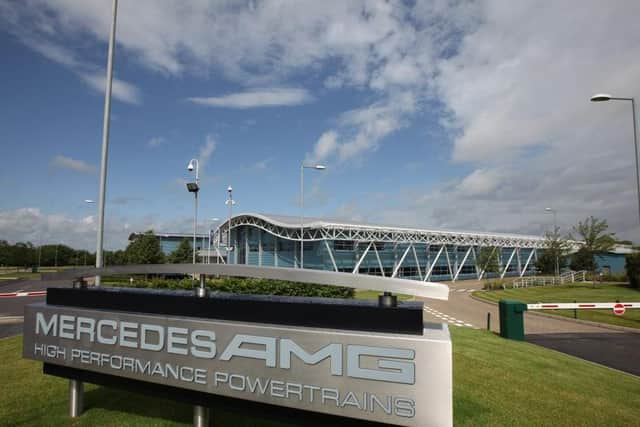Northamptonshire F1 team's breathing aids now helping save Covid-19 patients' lives in 46 NHS hospitals
and live on Freeview channel 276
Breathing aids developed land built by Formula One engineers in Northamptonshire are now helping save lives of Covid-19 patients at 46 NHS hospitals across the country.
Doctors at Northampton General Hospital were among the first to receive the ventilators last month, just a month after crack engineers from the Mercedes-AMG High Performance Powertrains factory at Brixworth first sat down with University College London medics to start developing the device and answer Government pleas for help.
Advertisement
Hide AdAdvertisement
Hide AdNow the device is on its way to hospitals from the Channel Islands to Glasgow, Belfast to Norwich aiding breathing in critical care patients without the need for invasive ventilation.
Mercedes-AMG HPP managing ldirector Andy Cowell said: “The supply of devices to the local Northampton hospital engendered a great sense of pride for the whole team.
"Now it is exceptionally pleasing to see that the flow devices swiftly engineered and produced in volume here at Brixworth are helping patients around the UK.”
Mercedes turned over their High-Performance Powertrain production facility at their Brixworth Technical Centre — which normally produces 1.6-litre turbo petrol-electric hybrid units for six-time world champ Lewis Hamilton — to manufacture the devices while the Grand Prix season was halted by the global pandemic.
Advertisement
Hide AdAdvertisement
Hide AdAround 40 machines used to make pistons and turbochargers for the F1 power units pumped out 1,000 devices a day for the NHS.


Further tweaks since initial prototypes were manufactured have made the device more efficient in clinical settings.
Professor Mervyn Singer, a critical care consultant at University College London Hospital, said: “We have seen this device help hundreds of patients with Covid-19 breathe more easily. Deployed across the NHS hospital network, this device will help to save lives by ensuring that ventilators, a precious resource, are used only for the most severely ill.
“We and others are finding that a significant proportion of patients treated in this way can avoid mechanical ventilation and recover more quickly as a result.
Advertisement
Hide AdAdvertisement
Hide Ad“The latest version of the device is much more oxygen efficient – in most patients, it requires little more oxygen than a ventilator. This is important, given there were concerns over oxygen supplies in some hospitals treating Covid-19 patients.”